|
|
 |
Fiche d'espèce de Copépode |
|
|
Calanoida ( Ordre ) |
|
|
|
Calanoidea ( Superfamille ) |
|
|
|
Megacalanidae ( Famille ) |
|
|
|
Megacalanus ( Genre ) |
|
|
| |
Megacalanus frosti Bradford-Grieve, Blanco-Bercial & Boxshall, 2017 (F,M) | |
| | | | | | | Syn.: | Megacalanus longicornis: Miller, 2002 (pp 129-142, figs 2-10.
Megacalanus princeps: Sewell, 1947 ( p. 25, Stn 131, female 8.53 mm).
| | | | Ref.: | | | Bradford-Grieve, Blanco-Bercial & Boxshall, 2017 (p. 37, figs. F,M, Rem.) | 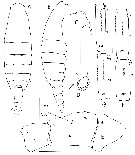 Issued from : J.M. Bradford-Grieve, L. Blanco-Bercial & G.A. Boxshall in Zootaxa, 2017, 4229 (1). [p.38, Fig.12]. Female (02.867°N, 80.850°W) : A-B, habitus (dorsal and lateral, respectively); C, anteropr head (lateral); D, caudal ramus (dorsal); E, A1 ancestral segment I-V (hs = hair sensillum, mc = macula cribrosa) (dorsal); F, A1 ancestral segments XIV-XV; G, A1 ancestral segments XVI-XVII. Scale bars: 1.0 mm (A-E; 0.1 mm on remaining figures. Nota: - Anterior head with low crest produced into short triangular projection extending beyond rostrum; - Posterior borders of pediger somite 5 extending into triangular lappets reaching 1/3 of way along genital double-somite, in dorsal view, lappets appearing pointed. - A1 dorsal surface of segments I-V each with very small hair sensillum of which those on segments I-III each accompanied by macula cribrosa; ancestral segments XIV to XVII with 15, 21, 32, 25 ventral teeth, respectively; and segments XV and XVI with variable numbers of blunt teeth along distoposterior border. - P1 outer spines on exopods segments 1 and 2 extending half way between bases of following 2 more distal spines; 1 macula cribrosa at base of outer spine on exopod segment 2.
|
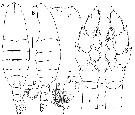 Issued from : J.M. Bradford-Grieve, L. Blanco-Bercial & G.A. Boxshall in Zootaxa, 2017, 4229 (1). [p.39, Fig.13]. Male (02.867°N, 80.850°W) : A-B, habitus (dorsal and lateral, respectively); C, anterior head (lateral); D, caudal ramus (dorsal); E, P5 (posterior view); F, inner distal margin of exopod segment 2 of left leg. Scale bars: 1.0 mm (A-C); 0.1 mm on remaining figures. Nota: - Head with low crest. - Posterior borders of pediger 5 extending as short triangular lappets, in lateral view, as far as posterior border of urosomite 1. - A1 on right woth ancestral segment XIX with 1 fused griping element extending beyond base of aesthetasc, 1 ms, 1a; XXI with 1 short gripping element at about midlength fused only at its base, 1ms, 1a. - P5 as in generic description, inner distal border of basis with setules, left exopodal segment 2 specialised seta wiyj basal part usually longer than wide, lash longer than basal part; right exopodal segment 3 with inner border completely lined with fine setules to just short of inner border articulated spine.
|
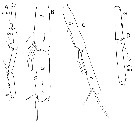 Issued from : J.M. Bradford-Grieve, L. Blanco-Bercial & G.A. Boxshall in Zootaxa, 2017, 4229 (1). [p.40, Fig.14]. Male (02.867°N, 80.850°W) details of selected right A1 ancestral segments : A, segments XIX-XXIII; B, segments XIV-XV; C, segments XIX-XX; D, segments XXI-XXIII. Scale bars: 1.0 mm (A); 0.1 mm on remaining figures.
|
 Issued from : J.M. Bradford-Grieve, L. Blanco-Bercial & G.A. Boxshall in Zootaxa, 2017, 4229 (1). [p.66, Table 7]. Morphological characters after identification key of Megacalanus females and males. Compare to other species of genus Main characters identification after species key : 1 - Head with crest in females and males.
|
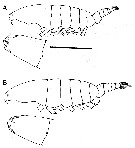 Issued from : C.B. Miller in Hydrobiologia, 2002, 480. [p.132, Fig.2]. As Megacalanus longicornis. Females: A, lateral habitus drawing (legs not shown) and dorsal view of cephalic crest of specimen collected offshore from Pt Conception (California: 34°50'N, 123°E); B, same for an uncrested specimen specimen collected near the Hawaiian Islands. In this specimen the maxilla and maxilliped are bent posteriorly and appear to emerge under the first pediger. Scale bar: 4.0 mm.
|
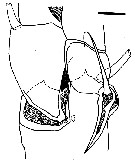 Issued from : C.B. Miller in Hydrobiologia, 2002, 480. [p.135, Fig.4 (left) side]. As Megacalanus longicornis. Female: anterior surface of basis, exopodite 1 and endopodite 1 of P1, illustrating the position and form of the basis spine and seta. A macula cribrosa is located on the basis beside the articulation of exopodite 1. Scale bar: 0.1 mm.
|
 Issued from : C.B. Miller in Hydrobiologia, 2002, 480. [p.136, Fig52]. As Megacalanus longicornis. Female: A, neural nexix that is the interior section of a macula cribrosa on the proximal surface of the mandibular gnathobase. B, surface spherules of the same macula cribrosa photographed at a higher focal plane. C, Macula cribrosa with fewer spherules, one of them located centrally, on exopodite 3 of male P5. Scale bars: 20 µm.
|
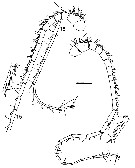 Issued from : C.B. Miller in Hydrobiologia, 2002, 480. [p.137, Fig.6]. As Megacalanus longicornis. male: Left (on the left) and right A1, dorsal aspect, left divided, repeating segment 15. Coiling of right antennule is of the most typical form, arrow indicates seta flattened against segment 17. Segments 12 and 13 from each side are also shown in ventral aspect where they bear patches of acuminate denticles; Scale bar: 1.0 mm.
|
 Issued from : C.B. Miller in Hydrobiologia, 2002, 480. [p.138, Fig.7]. As Megacalanus longicornis. Male (pjoyo): segments 7, 8 and 8 of right A1. Segment 9 bearing a clavate seta is at the right. Scale bar: 0.4 mm.
|
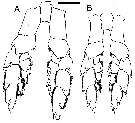 Issued from : C.B. Miller in Hydrobiologia, 2002, 480. [p.139, Fig.8]. As Megacalanus longicornis. Male: P5 (posterior view; left legs are on the left sides). A, Crested form from California. B, Uncrested form from North Atlantic. Scale bar: 0.4 mm.
| | | | | NZ: | 5 | | |
|
Carte de distribution de Megacalanus frosti par zones géographiques
|
| | | | | |  Issued from : J.M. Bradford-Grieve, L. Blanco-Bercial & G.A. Boxshall in Zootaxa, 2017, 4229 (1). [p.34, fig.9]. Issued from : J.M. Bradford-Grieve, L. Blanco-Bercial & G.A. Boxshall in Zootaxa, 2017, 4229 (1). [p.34, fig.9].
Distribution of Megacalanus princeps (filled triangle), Megacalanus frosti (open triangle), Megacalanus ericae (filled square) and Megacalanus ohmani (open square). |
| | | | Loc: | | | Eastern Pacific Ocean from off California to off Chile; W Indian (1.65°S, 61.23°E.
Type locality: 2.867° N, 80.850° W. | | | | N: | 3 | | | | Lg.: | | | (1316) F: 8,53-11,00; M: 9,50-11,20; {F: 8,53-11,00; M: 9,50-11,20} | | | | Rem.: | Bathypelagic, extending to mesopelagic depths (< 500 m to > 2000 m). One single female was found in the Arabian Sea.
After Bradford-Grieve & al. (2017, p.39), the crest usually prominent, but sometimes small. Ancestral segments XIV to XVII of female A1 with 15-18, 20-26, 24-28, 24-32 ventral teeth, respectively (n = 6 antennules). Male P5 left specialised seta with lash of variable length, sometimes shorter than basal part. Male ancestral segments XIV-XV ventral teeth with 17-29 and 35-39, respectively (n = 4). | | | Dernière mise à jour : 20/08/2018 | |
|
|
 Toute utilisation de ce site pour une publication sera mentionnée avec la référence suivante : Toute utilisation de ce site pour une publication sera mentionnée avec la référence suivante :
Razouls C., Desreumaux N., Kouwenberg J. et de Bovée F., 2005-2026. - Biodiversité des Copépodes planctoniques marins (morphologie, répartition géographique et données biologiques). Sorbonne Université, CNRS. Disponible sur http://copepodes.obs-banyuls.fr [Accédé le 28 février 2026] © copyright 2005-2026 Sorbonne Université, CNRS
|
|
 |
 |












